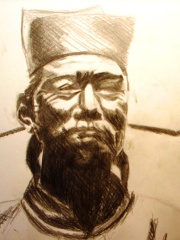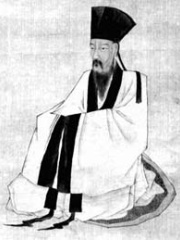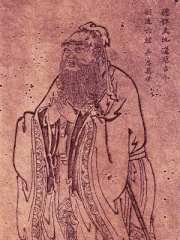
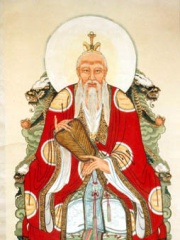
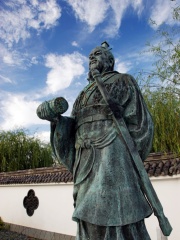
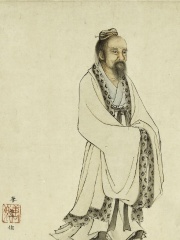
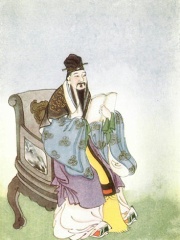
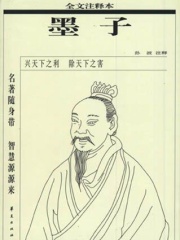
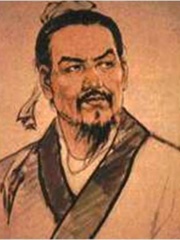
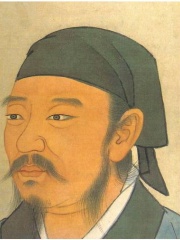
The Most Famous
PHILOSOPHERS from China
This page contains a list of the greatest Chinese Philosophers. The pantheon dataset contains 1,267 Philosophers, 44 of which were born in China. This makes China the birth place of the 9th most number of Philosophers behind Türkiye, and India.
Top 10
The following people are considered by Pantheon to be the top 10 most legendary Chinese Philosophers of all time. This list of famous Chinese Philosophers is sorted by HPI (Historical Popularity Index), a metric that aggregates information on a biography's online popularity. Visit the rankings page to view the entire list of Chinese Philosophers.

1. Confucius (551 BC - 479 BC)
With an HPI of 93.57, Confucius is the most famous Chinese Philosopher. His biography has been translated into 234 different languages on wikipedia.
Confucius (孔子; pinyin: Kǒngzǐ; c. 551 – c. 479 BCE), born Kong Qiu (孔丘), was a Chinese philosopher of the Spring and Autumn period who is traditionally considered the paragon of Chinese sages. Much of the shared cultural heritage of the Sinosphere originates in the philosophy and teachings of Confucius. His philosophical teachings, called Confucianism, emphasized personal and governmental morality, harmonious social relationships, righteousness, kindness, sincerity, and a ruler's responsibilities to lead by virtue. Confucius considered himself a transmitter for the values of earlier periods which he claimed had been abandoned in his time. He advocated for filial piety, endorsing strong family loyalty, ancestor veneration, and the respect of elders by their children and of husbands by their wives. Confucius recommended a robust family unit as the cornerstone for an ideal government. He championed the Silver Rule, or a negative form of the Golden Rule, advising, "Do not do unto others what you do not want done to yourself." The time of Confucius's life saw a rich diversity of thought, and was a formative period in China's intellectual history. His ideas gained in prominence during the Warring States period, but experienced setback immediately following the Qin conquest. Under Emperor Wu of Han, Confucius's ideas received official sanction, with affiliated works becoming mandatory readings for career paths leading to officialdom. During the Tang and Song dynasties, Confucianism developed into a system known in the West as Neo-Confucianism. In the 20th century, an intellectual movement emerged in Republican China that sought to apply Confucian ideology in a modern context, known as New Confucianism. From ancient dynasties to the modern era, Confucianism has integrated into the Chinese social fabric and way of life. Traditionally, Confucius is credited with having authored or edited many of the ancient texts including all of the Five Classics. However, modern scholars exercise caution in attributing specific assertions to Confucius himself, for at least some of the texts and philosophy associated with him were of a more ancient origin. Aphorisms concerning his teachings were compiled in the Analects, but not until many years after his death.

2. Laozi (604 BC - 600 BC)
With an HPI of 91.85, Laozi is the 2nd most famous Chinese Philosopher. His biography has been translated into 149 different languages.
Laozi ( low-TSUH; Chinese: 老子; pinyin: Lǎozǐ) was a legendary Chinese philosopher considered to be the author of the Tao Te Ching (Laozi), one of the foundational texts of Taoism. The name, literally meaning 'Old Master', was likely intended to portray an archaic anonymity that could converse with Confucianism. Modern scholarship generally regards his biographical details as later inventions and his opus a collaboration of various writers. Traditional accounts addend him as Li Er, born in the 6th-century BC state of Chu during China's Spring and Autumn period (c. 770 – c. 481 BC). Serving as the royal archivist for the Zhou court at Wangcheng (modern Luoyang), he met and impressed Confucius (c. 551 – c. 479 BC) on one occasion, composing the Tao Te Ching in a single session before retiring into the western wilderness. A central figure in Chinese culture, Laozi is generally considered the founder of Taoism. He was claimed and revered as the ancestor of the Tang dynasty (618–907) and is similarly honored in modern China as the progenitor of the popular surname Li. In some sects of Taoism, Chinese Buddhism, Confucianism, and Chinese folk religion, it is held that he then became an immortal hermit. Certain Taoist devotees held that the Tao Te Ching was the avatar – embodied as a book – of the god Laojun, one of the Three Pure Ones of the Taoist pantheon, though few philosophers believe this. The Tao Te Ching had a profound influence on Chinese religious movements and on subsequent Chinese philosophers, who annotated, commended, and criticized the texts extensively. In the 20th century, textual criticism by historians led to theories questioning Laozi's timing or even existence, positing that the received text of the Tao Te Ching was not composed until the Warring States period (c. 475 – 221 BC), and was the product of multiple authors.

3. Sun Tzu (544 BC - 496 BC)
With an HPI of 83.60, Sun Tzu is the 3rd most famous Chinese Philosopher. Her biography has been translated into 110 different languages.
Sun Tzu (;traditional Chinese: 孫子; simplified Chinese: 孙子; pinyin: Sūnzǐ) was a Chinese military general, strategist, philosopher, and writer who lived during the Eastern Zhou period (771–256 BC). Sun Tzu is traditionally credited as the author of The Art of War, a Classical Chinese text on military strategy from the Warring States period, though the earliest parts of the work probably date to at least a century after him. Sun Tzu is revered in Chinese and East Asian culture as a legendary historical and military figure; however, his historical existence is uncertain. The Han dynasty historian Sima Qian and other traditional Chinese historians placed him as a minister to King Helü of Wu and dated his lifetime to 544–496 BC. The name Sun Tzu—by which he is more popularly known—is an honorific which means "Master Sun". His birth name was said to be Sun Wu (traditional Chinese: 孫武; simplified Chinese: 孙武) and he is posthumously known by his courtesy name Changqing (Chinese: 長卿). Traditional accounts state that the general's descendant Sun Bin wrote a treatise on military tactics, also titled The Art of War. Since both Sun Wu and Sun Bin were referred to as "Sun Tzu" in classical Chinese texts, some historians thought them identical, prior to the rediscovery of Sun Bin's treatise in 1972.

4. Zhuang Zhou (369 BC - 286 BC)
With an HPI of 81.63, Zhuang Zhou is the 4th most famous Chinese Philosopher. His biography has been translated into 70 different languages.
Zhuang Zhou (), commonly known as Zhuangzi (; Chinese: 莊子; literally "Master Zhuang"; also rendered in the Wade–Giles romanization as Chuang Tzu), was an influential Chinese philosopher who lived around the 4th century BCE during the Warring States period, a period of great development in Chinese philosophy, the Hundred Schools of Thought. He is credited with writing—in part or in whole—a work known by his name, the Zhuangzi, which is one of two foundational texts of Taoism, alongside the Tao Te Ching.
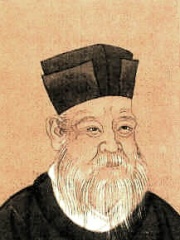
5. Zhu Xi (1130 - 1200)
With an HPI of 81.27, Zhu Xi is the 5th most famous Chinese Philosopher. His biography has been translated into 109 different languages.
Zhu Xi (Chinese: 朱熹; [ʈʂú ɕí]; October 18, 1130 – April 23, 1200), formerly romanized Chu Hsi, was a Chinese philosopher, historian, politician, poet, and calligrapher of the Southern Song dynasty. As a leading figure in the development of Neo-Confucianism, Zhu Xi played a pivotal role in shaping the intellectual foundations of later imperial China. He placed great emphasis on rationality, opposed mysticism and religious experience, and constructed a huge philosophical system. His extensive commentaries and editorial work on the Four Books became the core texts of the imperial civil service examinations from 1313 until their abolition in 1905. He advanced a rigorous philosophical methodology known as the "investigation of things" (格物) and emphasized meditation as an essential practice for moral and intellectual self-cultivation. Zhu Xi's thought exerted profound influence, becoming the official state ideology of China from the Yuan dynasty onward, and was later adopted in other East Asian countries such as Japan, Korea, and Vietnam. In these regions, his Neo-Confucian doctrines were institutionalized through educational systems and civil service examinations, shaping political ideologies, social hierarchies, and cultural values for centuries. Zhu was a scholar with a wide learning in the classics, commentaries, histories and other writings of his predecessors. In his lifetime, he was able to serve multiple times as a government official, although he avoided public office for most of his adult life. He also wrote, compiled and edited almost a hundred books and corresponded with dozens of other scholars. He acted as a teacher to groups of students, many of whom chose to study under him for years. He built upon the teachings of the Cheng brothers and others, further developing their metaphysical theories in regards to Li (Forma) and Qi (Materia). His followers recorded thousands of his conversations in writing.

6. Mencius (372 BC - 289 BC)
With an HPI of 79.37, Mencius is the 6th most famous Chinese Philosopher. His biography has been translated into 74 different languages.
Mencius (孟子, Mèngzǐ, MEN-shee-əs; c. 371 – c. 289 BC), born Meng Ke (孟軻), was a Chinese Confucian philosopher, often described as the Second Sage (亞聖) to reflect his traditional esteem relative to Confucius himself. He was part of Confucius's fourth generation of disciples, inheriting his ideology and developing it further. Living during the Warring States period, he is said to have spent much of his life travelling around the states offering counsel to different rulers. Conversations with these rulers form the basis of the Mencius, which would later be canonised as a Confucian classic. One primary principle of his work is that human nature is righteous and humane. The responses of citizens to the policies of rulers embodies this principle, and a state with righteous and humane policies will flourish by nature. The citizens, if they enjoy freedom under good rulers, will willingly take the time to care for their families, learn to perform proper rites, and become better citizens. This placed him at odds with his near contemporary, Xunzi, who believed that human nature is evil.

7. Mozi (470 BC - 391 BC)
With an HPI of 76.56, Mozi is the 7th most famous Chinese Philosopher. His biography has been translated into 56 different languages.
Mozi, personal name Mo Di, was a Chinese philosopher, logician, and the founder of the Mohist school of thought, making him one of the most important figures of the Warring States period (c. 475 – 221 BCE). Alongside Confucianism, Mohism became the most prominent organized school of the Hundred Schools of Thought throughout the period. The Mozi is an anthology of writings traditionally attributed to Mozi and to his followers. Born in what is now Tengzhou, Shandong, Mozi and his followers argued strongly against both Confucianism and Taoism, with a philosophy emphasizing universal love, social order, the will of Heaven, sharing, and honoring the worthy. Mohism was actively developed and practiced across the Warring States–era in China. Mohism fell out of favor following the establishment of the Qin dynasty in 221 BCE. While tradition assumes the destruction of many Mohist texts in 213 BCE as part of Emperor Qin Shi Huang's burning of books and burying of scholars, traces of Mohism can still be seen late in the early Han (from 202 BCE), in syncretic texts like the Huainanzi of c. 139 BCE. As Confucianism became the dominant school of thought over the fading legalism system during the Han dynasty (202 BCE – 220 CE), Mohism disappeared almost entirely by the middle of the Western Han period of 202 BCE to 9 CE. Mozi is referenced in the 6th-century CE Thousand Character Classic, which records that he was saddened when he saw the dyeing of pure white silk, which to him embodied his conception of austerity as simplicity and chastity.

8. Han Fei (280 BC - 232 BC)
With an HPI of 75.88, Han Fei is the 8th most famous Chinese Philosopher. His biography has been translated into 58 different languages.
Han Fei (c. 280 – 233 BC), also known as Han Feizi, was a Chinese Legalist philosopher and statesman during the Warring States period. He was a prince of the state of Han. Han Fei is often considered the greatest representative of Legalism for the Han Feizi, a later anthology of writings traditionally attributed to him, which synthesized the methods of his predecessors. Han Fei's ideas are sometimes compared with those of Niccolò Machiavelli, author of The Prince. Zhuge Liang is said to have attached great importance to the Han Feizi. Sima Qian recounts that Qin Shi Huang went to war with the state of Han to obtain an audience with Han Fei, but was ultimately convinced to imprison him, whereupon he commits suicide. After the early demise of the Qin dynasty, the school was officially vilified by the Han dynasty that succeeded it. Despite its outcast status throughout the history of imperial China, Han Fei's political theory and the Legalist school continued to heavily influence every dynasty thereafter, and the Confucian ideal of rule without laws was never to be realized. Han Fei borrowed Shang Yang's emphasis on laws, Shen Buhai's emphasis on administrative technique, and Shen Dao's ideas on authority and prophecy, emphasizing that the autocrat will be able to achieve firm control over the state with the mastering of his predecessors' methodologies: his position of 'power' (勢 shì), 'technique' (術 shù), and 'law' (fa). He stressed the importance of the concept of holding actual outcome accountable to speech (刑名 xingming), coupled with the "two handles" system of punishment and reward, as well as wu wei ('non-exertion').

9. Xun Kuang (313 BC - 238 BC)
With an HPI of 75.28, Xun Kuang is the 9th most famous Chinese Philosopher. His biography has been translated into 55 different languages.
Xunzi (荀子, Xúnzǐ, lit. 'Master Xun'; c. 310 – c. after 238 BCE), born Xun Kuang, was a Chinese philosopher of Confucianism during the late Warring States period. After his predecessors Confucius and Mencius, Xunzi is often ranked as the third great Confucian philosopher of antiquity. By his time, Confucianism had suffered considerable criticism from Taoist and Mohist thinkers, and Xunzi is traditionally regarded as a synthesizer of these traditions with earlier Confucian thought. The result was a thorough and cohesive revision of Confucianism, which was crucial to the philosophy's ability to flourish in the Han dynasty and throughout the later history of East Asia. His works were compiled in the eponymous Xunzi, and survive in excellent condition. Unlike other ancient compilations, his authorship of these texts is generally secure, though it is likely that Western Han dynasty historian Liu Xiang organized them into their present form centuries after Xunzi's death. Born in the state of Zhao, Xunzi studied at the prestigious Jixia Academy, where he learned about every major philosophical tradition of his time. After his graduation, Xunzi traveled to Chu where he mastered poetry, and then returned to Qi as a highly regarded teacher at the academy. His students Han Fei and Li Si each had important political and academic careers, though some of their Legalist sentiments were at odds with his philosophy. Other students such as Fuqiu Bo, Zhang Cang and Mao Heng authored important editions and commentaries on the Confucian classics. Later in his life, Xunzi served in the court of Lord Chunshen and died sometime after Lord Chunshen's death. The constant warfare of his time informed his work profoundly, as did his interactions with leaders and witnessing the downfall of various states. Xunzi's writings respond to dozens of other thinkers, whom he often directly names and criticizes. His well-known notion that "Human nature is evil" has led many commentators to place him opposite of Mencius, who believed human nature was intrinsically good. Though like Mencius, Xunzi believed that education and ritual were the key to self-cultivation and thus the method to circumvent one's naturally foul nature. His definition of both concepts was loose, and he encouraged lifelong education and applied ritual to every aspect of life. Other important topics include the promotion of music and the careful application of names. Though he still cited the ancient sages, he differed from other Confucian philosophers by his insistence on emulating recent rulers rather than those of long ago. Repeated oversimplifications and misunderstandings on Xunzi's teachings, particularly his view on human nature, led to gradual dismissal and condemnation of his thought from the Tang dynasty onwards. By the rise of Neo-Confucianism in the 10th century, Mencius gradually upended Xunzi, particularly by the choice to include the Mencius in the Four Books. Since the 20th century, a reevaluation of Xunzi's doctrine has taken place in East Asia, leading to recognition of his profound impact and relevance to both his times and present day.
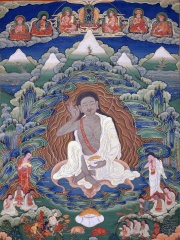
10. Milarepa (1052 - 1135)
With an HPI of 72.51, Milarepa is the 10th most famous Chinese Philosopher. His biography has been translated into 39 different languages.
Jetsun Milarepa (Tibetan: རྗེ་བཙུན་མི་ལ་རས་པ་, Wylie: rje btsun mi la ras pa, 1028/40–1111/23) was a Tibetan siddha, who was famously known as a murderer when he was a young man, before turning to Buddhism and becoming a highly accomplished Buddhist disciple. He is generally considered one of Tibet's most famous yogis and spiritual poets, whose teachings are known among several schools of Tibetan Buddhism. He was a student of Marpa Lotsawa, and a major figure in the history of the Kagyu school of Tibetan Buddhism. He is also famous for the feat of climbing Mount Kailash.
People
Pantheon has 44 people classified as Chinese philosophers born between 720 BC and 1942. Of these 44, none of them are still alive today. The most famous deceased Chinese philosophers include Confucius, Laozi, and Sun Tzu.
Deceased Chinese Philosophers
Go to all RankingsConfucius
551 BC - 479 BC
HPI: 93.57
Laozi
604 BC - 600 BC
HPI: 91.85
Sun Tzu
544 BC - 496 BC
HPI: 83.60
Zhuang Zhou
369 BC - 286 BC
HPI: 81.63
Zhu Xi
1130 - 1200
HPI: 81.27
Mencius
372 BC - 289 BC
HPI: 79.37
Mozi
470 BC - 391 BC
HPI: 76.56
Han Fei
280 BC - 232 BC
HPI: 75.88
Xun Kuang
313 BC - 238 BC
HPI: 75.28
Milarepa
1052 - 1135
HPI: 72.51
Shen Kuo
1031 - 1095
HPI: 72.33
Wang Yangming
1472 - 1529
HPI: 70.74
Overlapping Lives
Which Philosophers were alive at the same time? This visualization shows the lifespans of the 8 most globally memorable Philosophers since 1700.

